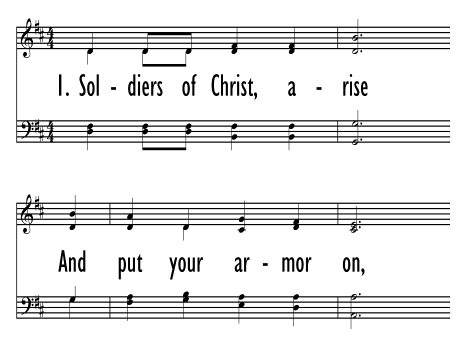- |
User Links
769
Keep What You Have Believed
Hymn Information
- First Line
- Keep what you have believed
- Paraphraser
- Emily Brink
- Tune Name
- DIADEMATA
- Composer
- George J. Elvey (1868)
- Topic
- Word of God · Elements of Worship: Profession of Faith
Copyright Information
- Text Copyright
- © 2008 Faith Alive Christian Resources
- Tune Copyright
- Public Domain
- Reprint/Projection Information
- Words: Permitted with a license from CCLI.com or from OneLicense.net. If you do not own one of these licenses, please contact the copyright holder for permission.
- Music: The Music is in the Public Domain; you do not need permission to project or reprint the Music.
Scripture References
- · · · · · · · · · ·
Confessions and Statements of Faith References
Further Reflections on Confessions and Statements of Faith References
While this text is based on Paul’s instructional testimony in II Timothy 3, it also carefully reflects Belgic Confession, Article 7, which expresses, “This Holy Scripture contains the will of God completely and that everything one must believe to be saved is sufficiently taught in it.” Our World Belongs to God, paragraph 32 says, “It is the Word of truth, breath of God, fully reliable in leading us to know God and to walk with Jesus Christ in new life.”
769
Keep What You Have Believed
Additional Prayers
A Prayer to Honor God’s Word
Lord God, master of the universe, from you comes all that makes us grow. You plant us into the banks of living streams and nourish us by your Word. You feed us with wisdom from on high. You bless us with teaching from a depth of centuries. You breathed out your wonderful Word and now you breathe on it again as we read and hear. We give you thanks through Jesus Christ. Amen.
—
Cornelius Plantinga, Jr.
769
Keep What You Have Believed
Hymn Story/Background
Near the end of his second letter to Timothy, the Apostle Paul encourages this young pastor to “continue in what you have learned…so that everyone who belongs to God may be proficient, equipped for every good work.” Emily Brink prepared this paraphrase of 2 Timothy 3:14-17 for Singing the New Testament (2008), a collection of 260 songs published with the goal “to help individuals, groups, choirs, worship teams, and congregations sing Scripture into their souls” (from the Preface of Singing the New Testament).
Composed for Bridges's text by George J. Elvey DIADEMATA was first published in the 1868 Appendix to Hymns Ancient and Modern. Since that publication, the tune has retained its association with this text. The name DIADEMATA is derived from the Greek word for "crowns."
The tune is lively and buoyant (though the harmony lacks life, especially the inner voices). Sing a strong unison on stanza 3 if using the Hal H. Hopson descant. A number of good choral and brass arrangements, useful for festive occasions, are available.
—
Bert Polman
Author Information
Emily Ruth Brink (b. 1940, Grand Rapids, MI) graduated from Calvin College (BA in Music), the University of Michigan (MM in Church Music) and Northwestern University, Evanston, IL (PhD in Music Theory). She taught at Manhattan (Montana) Christian School (1964-1966), the State University of New York (New Paltz; 1966-1967), Trinity Christian College (Palos Heights, IL; 1967-1972), and the University of Illinois (Campaign/Urbana; 1974-1983), also serving as organist and choir director in both Episcopal and Christian Reformed churches in those areas.
In 1977 she was appointed to the Psalter Hymnal Revision Committee, and in 1983 moved to Grand Rapids in a change of careers to become the first music and worship editor of the Christian Reformed Church. She was the founding editor of Reformed Worship; editor of the Psalter Hymnal (1987), Songs for LiFE (1994), Sing! A New Creation (2001, 2002); co-editor with Bert Polman of The Psalter Hymnal Handbook (1998), and editor of many other worship-related publications. Since 1984 she has been an adjunct professor at Calvin Theological Seminary, directing the seminary choir in the first years, and introducing courses on church music and worship before being granted emeritus status in 2009.
Her ecumenical work began with the Hymn Society in the United States and Canada, becoming the first woman president (1990-1992); in 2006 she was named a Fellow of the society in recognition of distinguished services to hymnody and hymnology. She served in both local and national offices of the American Guild of Organists, and has been a member for more than twenty years of the Consultation on Common Texts, serving as chair from 2008 to 2014.
In 2002, she became a Senior Research Fellow at the Calvin Institute of Christian Worship, contributing to The Worship Sourcebook and other publications; serving as program chair of the annual Symposium on Worship; and helping to plan and participate in worship conferences in more than fifteen countries.
—
Emily Brink
Composer Information
As a young boy, George Job Elvey (b. Canterbury, England, 1816; d. Windlesham, Surrey, England, 1893) was a chorister in Canterbury Cathedral. Living and studying with his brother Stephen, he was educated at Oxford and at the Royal Academy of Music. At age nineteen Elvey became organist and master of the boys' choir at St. George Chapel, Windsor, where he remained until his retirement in 1882. He was frequently called upon to provide music for royal ceremonies such as Princess Louise's wedding in 1871 (after which he was knighted). Elvey also composed hymn tunes, anthems, oratorios, and service music.
—
Bert Polman
Suggestions or corrections? Contact us


 My Starred Hymns
My Starred Hymns






